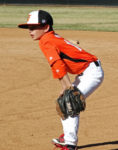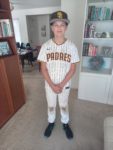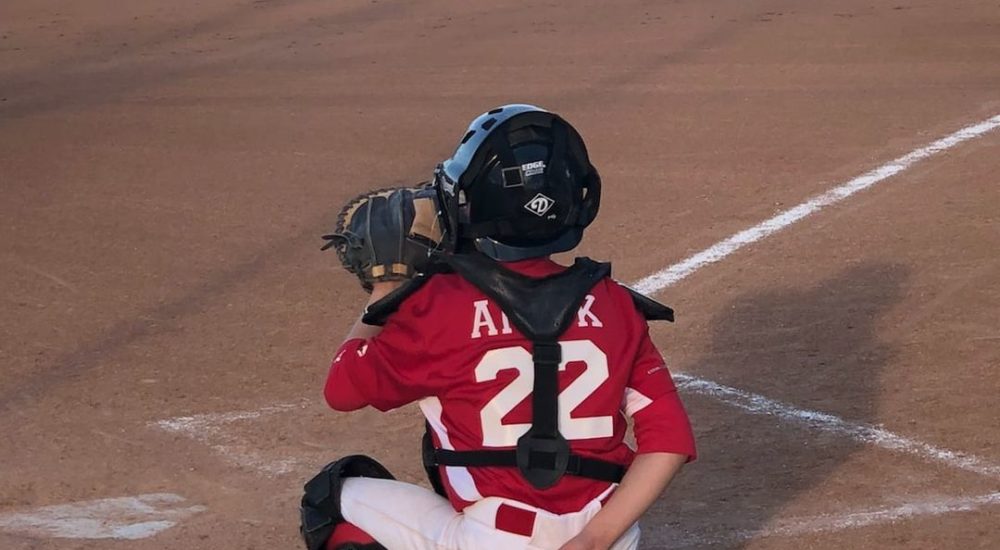Grit is defined on paper as “courage and resolve; strength of character.” My son, Oliver, turned 13 a few months ago and recently received an opportunity to demonstrate what it means in practice. He has played Irvine Pony League baseball since he was seven. I never asked him if he wanted to play. I signed him up because I wanted to share the experience with him. I threw him a thousand pitches in the park before he ever played his first game.
He started in 2016, playing at the “Pinto Machine Pitch” level where the baseballs were consistently dispensed and loaded by the team’s manager. He excelled. The pitches were predictable. He never struck out. He loved playing ball.
The next spring, he graduated to “Pinto Kid Pitch” where the missiles were not so precisely placed. He had to conquer the fear of getting hit by the ball. When he got the opportunity to pitch the next year, he learned to face the anxiety of potentially hitting the batter. Nobody wants to get hurt, but baseball requires you to overcome the trepidation of pain if you want to play, whether you receive it or inflict it.
The next level (Bronco 2019) permitted base runners to lead off and steal. It’s not even fair for 12-year-old catchers. Once a batter walks or progresses to first on the dreaded dropped third strike, it’s as good as a triple. Then they score on a wild pitch or a passed ball. A pitcher can throw a no-hitter and lose by five runs. It’s not really baseball. Any team with two strong pitchers and at least one competent catcher could win every game.
Midway through the season, Oliver was selected to play catcher. Our team hadn’t won a game all year. There weren’t high expectations. We were usually several runs behind when he came into catch. He hated it, but I was impressed by his serviceability at the position. Our team did eventually win one game, but I was afraid my son’s interest in the sport had waned.
When I asked him if he wanted to play in 2020, he passed. I wasn’t going to force it. And then COVID decided for us. Season canceled. I figured we were done with baseball. Then, his mom signed him up for a summer baseball camp in 2021 after the restrictions had lifted. I wasn’t hopeful. But when I picked him up after the first day, he was joyful in a way I hadn’t seen in a long time. He had spent the day in person with boys his own age playing with rag balls, no helmets, no pressure, coaches slow pitching to their own teams, everybody just having fun and enjoying the game. Sandlot style.
At the end of the camp, he asked me to sign him up for 2021 Fall Ball. Fall Ball is for the kids who play year-round. Kids who are serious about baseball. I was surprised but delighted that he was expressing interest. Based on his birthdate, he would have to play as a 14-year-old at the highest Pony League level. At try-outs, I was surprised by how big some of the kids were. High school freshmen.
The manager who selected him sent an email to parents asking which positions their sons had experience playing. I didn’t mention catcher. I knew he was most comfortable at second base or shortstop. Maybe left field. I received another email informing parents that no player had selected catcher as their preferred position. I made a judgment call and volunteered Oliver to serve, if needed.
 During the team’s first practice, he was offered the catcher’s gear and asked to man the plate. It did not go well. When his coach told him to give someone else a try, he returned to the bench, looked me dead in the eyes, and surreptitiously gave me the finger (not the sign for a fastball). Disrespectful, but message received. He was embarrassed. The job was too big for him.
During the team’s first practice, he was offered the catcher’s gear and asked to man the plate. It did not go well. When his coach told him to give someone else a try, he returned to the bench, looked me dead in the eyes, and surreptitiously gave me the finger (not the sign for a fastball). Disrespectful, but message received. He was embarrassed. The job was too big for him.
The kid who was selected to catch was Julian. He could handle the fastest pitcher on the team. During our first game, however, it became apparent that Julian was the second strongest pitcher, which meant somebody had to catch him. Oliver was called into service during our second game unexpectedly. His body language communicated his dread.
If the batter swings at a third strike that doesn’t land in the glove, it doesn’t matter if it’s a wild pitch or a passed ball. It’s all on the catcher. It’s stressful. The first time it happened he retrieved the ball and threw it 10 feet over the first baseman’s head. He was feeling some adrenaline. So was I. The scorekeeper behind home plate chirped her helpful advice. “You gotta catch that, Oliver!” Thanks. Got it.
After the second third strike got past him, he shouted an expletive that was clearly audible to anyone within 100 feet. The manager convened his battery at the mound and tried to calm Oliver down by explaining it was his responsibility to catch the pitches thrown. Thanks. Freaking got it! The final inning ended mercifully, but my son chose not to return his manager’s fist bump. He was demoralized.
On the way home from the game, he broke down. I could see he had experienced more than pressure. It was panic. He was shaky. There were tears in his eyes. My parental instincts kicked in and I assured him he would not have to catch again. I would speak to the manager. At the next practice, I explained Oliver’s anxiety and asked if we could find some other solution. The manager responded blandly, “Someone’s gotta put on the gear. He’s all we got.” I asked him to please give Oliver some practice time with Julian.
At the end of practice, he seemed upbeat. He was wearing the gear and he seemed cool with it. I asked him how he was doing, and he said he was good. At the beginning of our third game, the manager announced that Julian would be starting, and Oliver should warm him up. He shot me a concerned look and shook his head. I came over to talk with him. He asked me, “Didn’t you tell the manager I couldn’t catch?” I didn’t know what to say. “Yes, I told him that you were nervous about it. But nobody else wants to do it. Can you just try?”
I felt feeble. My predisposition is to protect my son (both physically and emotionally), but in this situation, I didn’t know how to do it in a way that wouldn’t belittle him. We had no choice but to face this anxiety together; me from my folding chair, him from behind the plate. Julian struck out the first batter and Oliver held the third strike. I exhaled. Let’s go. Two more. The next batter followed a more familiar pattern. Walk to first, steal second, steal third, home on a passed ball. Then Julian got another third strike that stuck in the catchers’ mitt. Come on, one more.
The next batter got a hit and progressed to third on uncontested steals. The batter at the plate had two strikes and I was silently pleading for a caught third. The pitch was in the dirt, the batter swung, and Ollie had to throw him out. He pounced on it, fired a three-hopper down the line and the first baseman picked it before the batter got there. I was overjoyed. I met Oliver in the dugout to congratulate him. I could see that excitement was replacing fear.
During the second inning, Julian was facing the lower half of the lineup. He kept throwing strikes and Oliver kept catching them. They found a rhythm. After three consecutive clean strikeouts, Ollie rolled the ball out the mound and returned to the dugout looking like a stud catcher. The manager decided to send Julian out for a third inning. Oliver happily obliged.
After two quick strikeouts (both caught), Julian was back to the top of the lineup. He gave up two hits and had runners at second and third. The first two pitches to the next batter were down the middle for caught strikes. Please, God, just one more. The third pitch was in the dirt, but Ollie blocked it and the runners held. The fourth pitch was a swing and a miss. Caught the third strike. Hallelujah. Oliver knew that would be his last out as catcher for the day (pitchers can only throw three innings). He jubilantly ran to the mound and hugged Julian. At the end of the top of the third inning. You don’t see that in baseball very often.
I’ve never been prouder of my son. In his moment of triumph over fear, he chose to give credit to the pitcher, which is what a catcher always does. Nobody remembers who caught the no-hitter. The catcher’s job is to catch whatever is thrown at them. It’s a hard job, but somebody has to do it. It takes grit. My son caught it.
For breakfast this morning, I had eight putouts and one assist. 😊
Author: @steveamick
